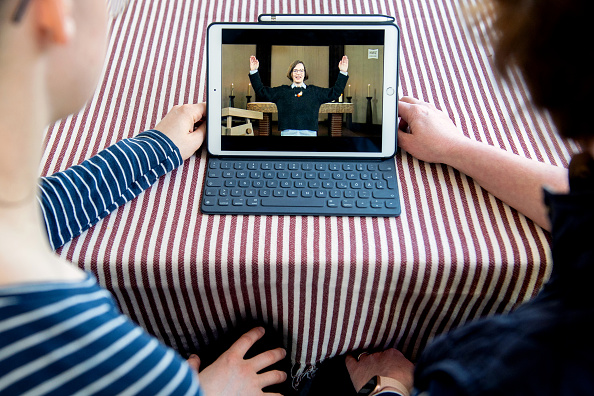Preaching in the Times of Corona
Zoé Chevalier | zc2504@columbia.edu

This Sunday is not like any other. There is no singing and dancing, no coming together and hugging at the United Pentecostal Church in Harlem. Instead, Pastor Michael Grattan is alone in his office, preaching on Facebook Live, while comments pour in: “I’m watching from Wisconsin,” says one, many just send “Amen,” another one just says “I made it!”
It was not easy to connect to the Pastor’s sermon this morning. There were technical glitches, and the video stopped in the middle, leaving only a 7-minute segment available. These are the realities of preaching in the times of Corona.
The Church on 125th closed its doors on March 22nd for Sunday services but remains open for weekly prayer and Bible study on Wednesdays and Fridays. There, the few congregants sit on different benches and avoid getting close to each other.
If Bible study became online, the pastor fears that he would lose the back-and-forth conversations that are at the heart of the experience. He also fears that he will have to simplify his lessons because he thinks it is harder to explain complicated concepts online: “I see these TV evangelists,” he says, “they have 10,000 people in one room, but everything they say is so basic.” Especially now in this time of crisis, Grattan says he wants to focus his next lessons on the book of Revelations. “There is a hunger for it,” he says.
The Book of Revelation is the last book of the Christian Bible, written by an unidentified “John”. According to Pastor Grattan, the book recounts how the Antichrist will come down to earth and tempt humans to follow him, those who do will be stained by the “mark of the beast” and have their soul destroyed. This apocalyptic tale fascinates believers according to Grattan, as all try to find resemblances between the text and modern-day life. The virus is only intensifying a question that Christians have been asking themselves for hundreds of years: “Are we in the end times?”
Grattan’s Sunday sermon focused on a more positive message, one of hope: “Once we overcome the fear of death, we are able to overcome all anxieties in life,” he says on the screen, adding: “If we do what we can, God will do what we cannot.”
The cancellation of Sunday service came as a relief to some according to Iris Grattan, the daughter of the pastor. She says that worshippers were worried about sinning by not going to Church to protect themselves from the virus. “[They thought] am I being fearful and not believing in God? Iris says.
Grattan worries about his ability to connect with less technically-savvy members of the community, like those who do not have access to Facebook. Some older members have only an old flip phone, others do not even have a cellphone. Grattan tries to stay connected with them through texting and calling, but he does not know how he will keep the connection strong in the future. “I don’t have answers yet,” he says, “I have never been faced with this before.”
